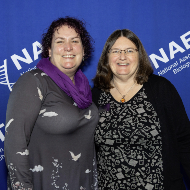As community college professors, and current and former National Association of Biology Teachers leaders, we teach evolution because an understanding of this critical concept and process helps our students not only to comprehend the historical context of life, but also to interpret current topics in science and society and determine best courses of action to address these issues.
Preparing future leaders to make informed decisions
Sharon Gusky and Tara Jo Holmberg, both of Northwestern Connecticut Community College, and both leaders in the National Association of Biology Teachers, explain that "evolution is the core paradigm of all life, earth, and environmental science courses" at the community college where they teach.
Evolution is the core paradigm of all life, earth, and environmental science courses at our community college.
Evolution is the core paradigm of all life, earth, and environmental science courses at our community college. In other words, it is the lens through which we teach students to view all of biology. It is important to us that all our students are well-versed in core concepts of evolution; our students are leaders in their communities and will continue to be into the future. Former and current students serve on town councils and community boards. They work, discuss, vote, and make personal decisions based on information gathered from our courses and programs. Many of our students are also first-generation college attendees who share what they learn with parents, siblings, and children. Our teaching with an evolutionary paradigm instills in them a grounded scientific approach for current and future decisions.
Evolutionary lessons of the past and present should inform societal approaches to future problems within human and natural systems. An understanding of evolution provides a context for students to begin to address the two largest environmental crises of our time: climate change and biodiversity loss, in our own backyard and beyond. Teaching students about natural selection and the importance of biodiversity helps them comprehend the long-term implications of mass species loss and how human activities cause selective pressures contributing to this loss. In turn, this provides them with knowledge to make informed decisions about products they buy and lifestyle choices they make.
Teaching evolution through active learning strategies and inquiry helps students to appreciate the critical problem of surging antibiotic-resistant diseases due to antibiotic misuse and the ramifications for public health. As a result, students may personally ask for more information about prescribed antibiotics for themselves and their family members. Ideally, this will reduce misuse of antibiotics, prevent the seeking of antibiotics during viral infections, and encourage the more judicious use of antimicrobial products.
We are honored to represent the National Association of Biology Teachers (NABT). We have both benefited professionally from a number of different NABT programs available for currency and fluency in teaching evolution and related concepts. We encourage our colleagues to join us in teaching evolution to every student, no matter what their future career path, so that current and future leaders, and the general public, can make scientifically informed decisions about the issues that affect us all.

